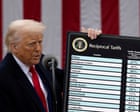
In a rapidly evolving global political environment, recent developments highlight both challenges and opportunities facing international relations and trade. Central to these discussions are recent moves by former U.S. President Donald Trump and entrepreneur Elon Musk, each making headlines with actions that reflect broader currents of change.
On one front, former President Trump has signalled potential shifts in U.S.-European trade relations by threatening to impose a 17% tariff on European food and farm produce exports. This strategic announcement came during a series of discussions in Washington. Should these tariffs be implemented, a range of beloved European products — from Belgium’s renowned chocolate to Ireland’s cherished Kerrygold butter and exquisite olive oils from the Mediterranean — would be notably impacted. Although the European Union has expressed a preference for diplomatic negotiations to resolve these tensions, it has also prepared itself for a potential escalation, suggesting that retaliatory duties may be considered should talks falter.
This trade-based tension is set against a backdrop of political manoeuvring and realignment within the United States, as evidenced by Elon Musk’s announcement of a new political entity, the Parti de l’Amérique. Musk, the innovative mind behind Tesla and SpaceX, declared the party’s formation as a move towards enhancing personal freedoms. This announcement comes after a public fallout with Trump over budgetary legislation, revealing rifts that have grown in the months leading up to this development. The creation of the Parti de l’Amérique illustrates not only the diversification of political voices in the U.S. but also reflects the dynamic nature of political affiliations and their impact on governance.
Beyond these immediate developments, there exists a broader narrative regarding the shifting landscape of conservatism and its varying interpretations globally. As societies grapple with rapid changes — whether technological, economic, or political — the established norms and structures often feel uncertain. This uncertainty can lead to the emergence of unconventional solutions and ideologies as communities strive to find footing in a transforming world. As such, it is essential not to underestimate the complexities and potential hazards inherent in navigating these periods of transition.
Through this discourse, both Trump and Musk embody the convergence of past influences and future aspirations, demonstrating how individual actions and decisions can stimulate both dialogue and division on a global scale. In navigating the current climate, stakeholders are tasked with balancing these intricate elements while fostering collaboration and understanding across borders.
As nations, enterprises, and individuals adapt to these realities, the pathways forward will invariably be shaped by collective resilience and the pursuit of mindful, constructive outcomes. The global community stands at the cusp of change, equipped with the insights and experiences necessary to address these challenges with innovation, empathy, and a shared commitment to progress.
Source: {link}
